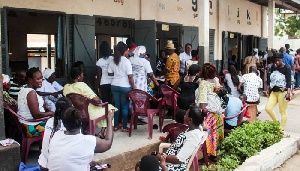The Trinity Presbyterian Church in Takoradi has organized a free health screening for its members and people living around its premises.
As part of the screening, young and elderly men in the church and around the premises were taken through testicular tests.
This was to ensure that there were no unusual lumps or bumps in their testicles which could cause testicular cancer and lead to low sperm counts.
The free health screening, which was patronized by over 1,000 people within the Sekondi-Takoradi Metropolis, was part of activities to commemorate the 90th-anniversary celebration of the church.
According to the chairman of the anniversary planning committee, Mr Peprah Sekyere, low sperm had become a problem among some men of late; hence the decision by the church to start checking it now through testicular tests.
The participants were also screened for malaria, blood pressure, cervical cancer screening, and breast examination as well as blood group.
They were also taken through breast screening, cervical cancer screening, body mass index, glucose test, blood pressure test, malaria, ear, eye and nose treatment and were allowed to register for or renew their National Health Insurance cards.
A member of the church, Rev. Alexander Boateng, explained that the mission of the Presbyterian Church was not only to spread the gospel but also to provide medical care to the people.
He mentioned that Christians had a responsibility to give to the poor and needy in society and that the health screening was an avenue to show some love to such vulnerable people in society.
He stressed the need to avoid unhealthy lifestyles and to report to health facilities for early treatment of all ailments.
He explained that individuals who went through the process were given free medication depending on the type of disease, whilst some were referred to the hospitals for further treatment.
He advised the patients to maintain healthy lifestyles, avoid alcohol, smoking, eat lots of fruits and vegetables as well as exercise regularly.
Mrs Sylvia Ofosu-Dwamena, leader of the sub-committee on health and allied programmes of the 90th Anniversary Committee of the church, stated that the crux of the examinations and tests was to look out for diseases within the systems of participants before they developed any symptoms.
According to her, from a medical perspective, prevention was better than cure, and that it was also often easier to treat or cure a condition in its early stages.
She encouraged the general public to regularly exercise and to take health screening activities seriously.
Eric Bruce-Amartey Jnr, chairman of the sub-committee publicity and publications of the 90th-anniversary Committee, noted that it was the firm belief of the Trinity Presby Church that health screenings should be an important priority for everyone.
“The programme was organised to stimulate the awareness of the general public about healthy living”, he added.
He noted that the health screening focused on preventive care since diagnostic tests were often run when a patient was already showing signs and symptoms of a condition.
Health News of Wednesday, 27 June 2018
Source: dailyguideafrica.com













